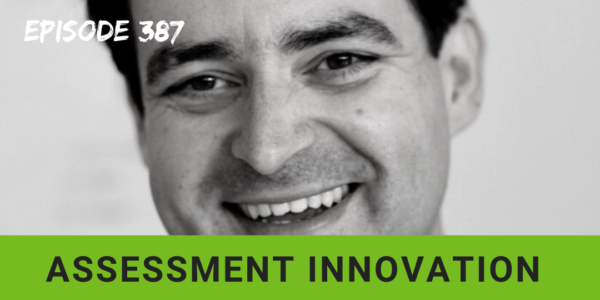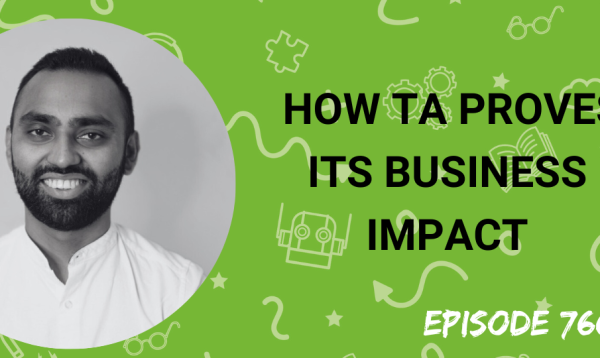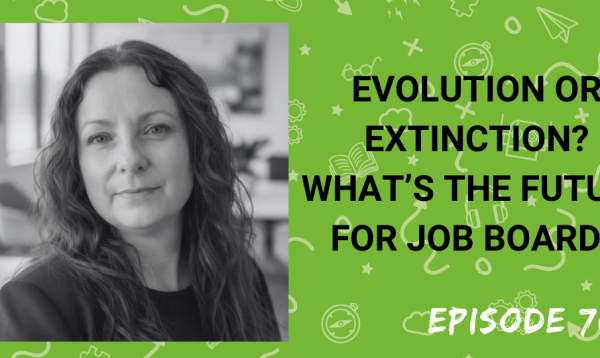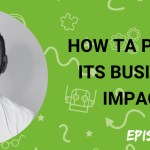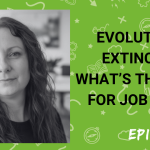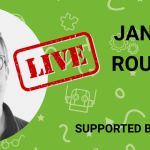Over the last couple of years, I’ve become fascinated by the innovation in the tools available to assess candidates in the recruiting process. While there are a growing number of impressive technologies and techniques, up to this point, it has actually been quite challenging to get solid case study evidence of effectiveness.
My guest this week has recently run a case study based award process for assessment innovation that provides the evidence of adoption and success that we have been looking for.
I’m delighted to welcome Netherlands based consultant Bas van de Haterd back to the show. Bas has been on the podcast a few times showcasing new thinking in assessment and, in this conversation, talks us through five very different case studies of assessment innovation in action.
In the interview, we discuss:
• Assessment innovation and adoption
• Using inclusive assessment techniques to broader talent pools and increase diversity
• Improving recruiter efficiency and effectiveness
• Mapping cognitive capabilities and ignoring resumes
• Lessons in spotting long term potential from elite sport
• Alleviating burn out
• Measuring ROI over long periods of time
• Mitigating bias
• What can we expect to see in 2022
•
Listen to this podcast in Apple Podcast.
Transcript:
Matt Alder [00:00:00]:
Support for this podcast comes from Appcast, a leading provider of recruitment, advertising technology and services. Appcast helps more than 1500 companies find more qualified candidates using advanced programmatic technology and data driven analytics. With appcast, you’ll effortlessly attract the right talent to your open jobs, helping you save time and money. Find out more about Appcast at Appcast IO. That’s Appcast IO.
Matt Alder [00:00:51]:
Hi everyone, this is Matt Alder. Welcome to episode 387 of the Recruiting Future podcast. Over the last couple of years I’ve become fascinated by the innovation in the tools available to assess candidates in the recruiting process. While there are a growing number of impressive technologies and techniques, up to this point it’s actually been quite challenging to get solid case study evidence of effectiveness. My guest this week has recently run a case study based award process for assessment innovation that provides the evidence of adoption and success that we’ve been looking for. I’m delighted to welcome Netherlands based consultant Bas Van Der Haterd back to the show. Baz has been on the podcast a few times showcasing new thinking and assessment and in this conversation talks us through five very different case studies of assessment innovation in action. Hi Bas, and welcome back to the podcast.
Bas Van De Haterd [00:01:53]:
Well, great to be here Matt.
Matt Alder [00:01:54]:
Always a pleasure to have you on the show. For the very few people listening who may not have heard you on the show before, could you just introduce yourself and tell us what you do?
Bas Van De Haterd [00:02:03]:
My name is Bas Van Der Hatherd and next to being a big fan of the Recruitment Future podcast, I am also a consultant of improving assessment technology. I host events on that, I host two awards on that. And, and really recently I’ve become the co host of the Talent Savvy podcast.
Matt Alder [00:02:27]:
Absolutely. And I’ve just been listening to the first episode and I definitely recommend it as something that people, people check out. In terms of assessment, the last time you were on, I think we were talking about some of the incredible innovation that’s going on in the assessment sector and it just seemed to me that when we were talking, the innovation was sort of ahead of the market, if that makes sense. In terms of people sort of adopting and using some of interesting techniques and technologies that are out there. Just as a first question, to give us a bit of context, what are you seeing happening in the assessment space at the moment? You know, what’s being adopted, what’s working, what are people thinking?
Bas Van De Haterd [00:03:07]:
First of all, I think we see a Lot more adoption. And I mean it’s popping up everywhere, all kinds of companies are using it. I see an incredible adoption in the startup and scale up market, which is really interesting to see because they don’t consider a bad hire to be a part of the standardized product process. They’re just saying, listen, we made a bad hire, so we need to improve our hiring process, which is really cool. And then they find articles about why resumes don’t work that well. And so you see a massive adoption there. I mainly see right now the adoption of the traditional questionnaire, but with feedback loops and a sort of AI machine learning technology behind it that’s really big. I’m not sure if I’m a massive fan of it, but it’s really big. And I see a lot of games and gamified assessment tools being adopted and implemented all around for really, really broad range of organizations. So I see a lot of governments here in the Netherlands especially adopting it, which isn’t the most traditionally innovative organizations. But they’re doing it because they want to be more equitable, they want more diversity and they’re noticing that resumes will have bias in them or the people reading them. And I see a lot of small and innovative companies using them. So it’s really interesting that the adoption has really grown a lot. And that’s actually why I started my Innovation in Selection award this year.
Matt Alder [00:05:02]:
That’s why I wanted to get you back on the show to really talk about that. Because I think what’s really interesting is obviously you’re looking at adoption and you’re looking at results and that really sort of moves the conversation on from considering the technology and whether it might work and what might happen. So tell us about the award. How does it come about? How’s it, how’s it judged? What’s the format of it?
Bas Van De Haterd [00:05:23]:
The award is basically everybody within the Dutch language sphere, because it is a Dutch award, can submit a case and we ask you, what did you change, how did you change it and what were the results? I mean, we can’t make it any easier. And we look at both. Did it improve the candidate experience? Because we’ve got one judge who is a candidate experience expert. We look at the scientific validation of the system and we’ve got a registered IO psychologist and actually the HR director of the Dutch Institute of Psychologists. But we’re also looking at how does it, Is it just talent attraction or does it go further? That’s why we’ve got like the HR director of Heineke is one of the judges We’ve got the head of selection of the Flemish government as one of the judges, and we’ve got the former head of talent acquisition from ING Bank Global as one of the judges. So we’ve got a big panel of judges who look at different aspects of the case study. And eventually we look at what did you do, how did you improve it and what were the results? Because innovation is never a goal in itself. It’s about getting in better candidates, as.
Matt Alder [00:06:55]:
I would 100% expect from you. That sounds like a very, you know, robust process and a kind of a very knowledgeable and relevant judging panel. Tell us about the nominations. What have you seen? What have been the really interesting entries that have resonated with you?
Bas Van De Haterd [00:07:11]:
We had a long list, basically everybody who submitted a case study. And then we did a first selection and we went to the nominations. And with your permission, I’d just like to mention all five, what they did, what they achieved. And yeah, people can learn from it. So the first one I want to talk about, it’s actually not a traditional corporate company. It’s. It’s an agency, but an agency with a 100% focus on refugees. They’re called Just Arrived. And what they’ve been doing is using standardized psychometric skill testing, basically questionnaires, with a few gamified cognitive assessment, but mostly psychometrics. And with these reports, they’re looking at, okay, so you’ve come from Syria or Afghanistan or Nigeria or whatever you are. You’re allowed to work in this country now. And they’re mainly focused in Sweden right now, but they’re expanding all over continental Europe. And they’re giving the reports of the psychrometrics. First of all, they’re using the reports to, okay, what would fit your profile? How do you fit the profile with the jobs we’ve got? Because they’ve also got profiles on what trades do you need in certain jobs. And with this they’re able to convince hiring managers, companies that although we don’t recognize their diplomas or we don’t know exactly what. Well, a car mechanic in Afghanistan, is it the same type of car mechanic as you need in Stockholm? Well, here’s. You said a car mechanic needs these traits. We can prove this person has these traits. And the reason this is such an awesome case is that they have the candidates do the tests in their own native language. They support 170 different languages, Matt. So an Afghan can do it in his own Afghan language. And we know this improves the results so much because you being a native English speaker, will probably interpret some of the questions different than me. Although as a Dutchman, I speak decent English, but I just don’t know every word and the words don’t have the exact same meaning. So doing it in your native language improves the quality of the results so incredibly much that they were. And to be honest, their. Their result was very simple. They were able, using this technology, to place three times as many people using the same number of recruiters in a year.
Matt Alder [00:10:20]:
I mean, that’s really interesting. And it’s such an interesting part of talent acquisition. I mean, as you know, on your recommendation, I had your friend Ojen on in episode 384, so two episodes before this one, talking about the work he’s doing with refugees. So that’s super interesting and also really logical, but perhaps something that people haven’t considered or haven’t done for me.
Bas Van De Haterd [00:10:42]:
And this is actually something which your agency listeners might be really interested in. They’ve noticed that it’s so much easier to convince clients to start a conversation if you have a report on their characteristics. Instead of just saying, now this person is really good. I’ve interviewed this person, he or she is really good. Now you just have like, okay, we’ve got scientifically validated data that these are the characteristics. You told me you needed somebody with between 60 and 80 extra version. This person has it, so it changes the conversation. And they’ve been able to triple the number of placements in a year.
Matt Alder [00:11:27]:
Wow. What was the name of the agency?
Bas Van De Haterd [00:11:29]:
The agency is called Just Arrived. It’s a Swedish agency and their assessment partner is called Talent Data Labs.
Matt Alder [00:11:36]:
That sounds like a great entry. Tell us about the next one.
Bas Van De Haterd [00:11:38]:
The next one is actually a stock market trader called Inc. And they changed the process in 2019 to from screening out to screening in for a big part. And they started using a technology called Brains first, which does. Which is one big game. And they don’t like me calling it a shooting game. But basically it’s three types of sort of shooting game and it’s an awesome tool. They’re able to really map your brain. And what they’ve done is they’ve been able to have all their current stock market traders play the game as well. And they now mapped out what does the brain of a stock market trader look like. And as you might imagine, you need to be highly analytical, but also you need extreme reaction speeds. You almost need Formula one driving reaction speeds, because stock markets. But if you need more than a second to make a choice, the price has changed. And what they’ve been doing is simply saying, okay, so this is the brain which a trader has and they’ve been able to expand in the number of universities they’re now letting people in from. Because it used to be like Oxford, Cambridge, Insead, that’s about it. And now they’re like, well, why do we really believe that there’s no talent which fits the stock market in all of these other universities? So by now having the possibility to basically automatically apply and they’ve got, they said we have a white zone which is if you, if your brain matches our best trader’s brain or a trader’s brain by over 80%, you’re automatically screened in and you will get an interview. No matter your education, if it’s in the gray zone, which is between 16, 80% match with the best, the current traders, we will look at some data, you know, we will. Usually you also get an interview and if it’s below that, we don’t even care if you went to Oxford because obviously you don’t have the cognitive capabilities to be a great trader. And this resulted in more people, and especially more people with different backgrounds coming through the first phase of the process while spending a lot less time on CV selection. And the other awesome thing they did is they opened it up, they literally put on their site, check if you, if you will get through the first round, do you have a trader’s brain? So people can now actually check if they’re fit for the job even before applying. And I see a lot of people doing that from all kinds of regions of the world and different academic backgrounds, which they probably would have, which they, at least until they started using this tool, had never seen applying in their work before.
Matt Alder [00:14:58]:
That is amazing stuff. And I spoke to Brains first on the podcast a few months ago actually at your recommendation and really, really interesting piece of technology and piece of science there. And it’s not come from the recruitment industry, it’s actually come from selection and elite football. Talent spotting in elite football. And while I think there are probably some. The applications of it in recruiting, maybe something you can’t use across the board, that sounds like a, that obviously sounds like a fantastic way to use their technology. So, yeah, sounds, sounds brilliant.
Bas Van De Haterd [00:15:30]:
Yeah. And because one of the other nominees, and actually, and I hope I don’t have people now because I wanted to end it with this one, but it’s. The actual winner was an elite football team, which is really strange of course, for an HR recruitment award to be awarded the very first one to an elite football team, but they actually Submitted a case of az, which is one of our top four elite football teams here in the Netherlands. And also by brains first. And they actually won the award because they’ve been using it for. Since 2018 for selection. And this year they’ve been able to prove not just that it works because over 55% of all the minutes played by the players from this team are homegrown. I mean, this, this is a team playing in Europe as well. You know, they play European competitions, but they’ve sold for over 60 million euros in players this summer. Homegrown players. And the two most important ones, and this was basically three players for 60 million. And the two most important ones, actually, until the age of 16, were every year on the verge of being kicked out of the academy. And only because of their brain profiles they were allowed to stay on. And they were, they were told, listen, as soon as these guys start growing. And right now they’re actually pretty tall players, but they used to be until the age of 16, they were like the smallest in their class until the. And they were told, no, as soon as these players start growing, they’ll be geniuses. They’ll. They’ll be really great. And they’re now playing in both of them in the French competition and both of them have caps for the Dutch national team already. And they’re also, and this is what I love about, again, the brains first technology. And this is why they won the award. It’s not just that they’re selecting people in who wouldn’t have gotten a chance on their physical characteristics. It’s also that they’re literally putting them in different positions in the field. Like, okay, as a youth player, you can basically make it as a striker because you’re just that good, you know, according. And you’re not playing the top pros, but they’re like. But you’re not. You don’t have a striker’s brain. They have several types of strikers, of course, within their. I mean, Harry Kane is a different type of striker than Marcus Rashford or Lukaku is a different type of striker than Lionel Messi. So. But they notice that these players don’t have a striker’s brain. They might have a winger’s brain or maybe even a defensive midfielder brain, and they’re moving them to different positions already in, in the younger years or they develop better. And so they’re literally putting people in different positions. And I actually know for a fact from one of my clients, a government agency who uses them, that they did the same with applicants. They had it for a certain traineeship. And they did these brain tests and they said, okay, but I’m really sorry, you just don’t have the brain for this traineeship yet. We’re also looking for people in this job and you do have the brain for that type of job. So would you be interested in applying here? And they actually did. So that’s why they ended up winning the award as a soccer team, because they had the best results. I mean, let’s be honest, 60 million in profit.
Matt Alder [00:19:38]:
Yeah, well, exactly. I mean, there’s financial ROI, there’s winning games and getting selected for the Dutch national side. I mean, that’s obviously some strong evidence there. What I think is really interesting about that though, just in terms of paralleling that into companies that aren’t football teams. It’s just the understanding of potential and the long term investment in talent and the rewards that you can get from that just by using that scientific approach. I mean, that’s, I can see, you know, I can see why that was the winner. That’s absolutely fascinating.
Bas Van De Haterd [00:20:09]:
Just to add a little bit, one of the things which I think might be an award winning in a couple of years, they’re now also using the same technology in order to spot weak spots for healthcare professionals. So you might be a little less on, I don’t know, planning and organizing stuff or this. And one of our major hospitals, especially now in the COVID crisis, is trying to amend these things. So, okay, we’ve got a few healthcare professionals who are just not as good in a certain aspect of their work. And instead of having them quit and burnout because they need to do it, they’re assigning them special assistance for specific needs to relieve them of the work they’re really bad at. So if you have a physician who’s terrible at planning, he just gets a planning assistant and all of a sudden he can focus more on the work, which he is really good at basically operating and cutting people open and making sure they stay alive. And it just, it helps so much with the burnout.
Matt Alder [00:21:23]:
I’d love to talk about this all day, but I’m conscious that we, we should probably finish this podcast within, within a reasonable time. So tell us, tell us about the other two nominations.
Bas Van De Haterd [00:21:32]:
The other two one which was really great as well. And they got a positive note from the jury is called the Brow Blackstone Westbrook, which is one of the biggest law firms in the Netherlands. And I think they’re actually pretty big in the UK as well. But then under the name Blackstone, but it’s A law firm, again not a type of company which you expect to be really innovative. But they only been starting using this technology and it’s basically questionnaire, it’s psychometric assessment. They’re using the selection lab. It’s psychometric assessment with a few cognitive tests. But they so trust the technology right now that they’ve done away with asking for grade lists. So the only question they now ask is did you finish law school? And we’re not going to look at which law school it is anymore. We’re not going to look at your grades which used to be the primary kick out, you know, but they’re just okay. We know that these kinds of characteristics have the tendency to perform well. They also measure for work preference. So what type of work environment do you consider to be preferential for you? And they’re selecting in on those and which is quite basic but they have an awesome feedback system in there. So every year they’ll look at the law trainees, which they’re called in the Netherlands and did they get a permanent contract? If yes, then apparently this character fits well. How well were they rated? Are they going into the partnership program or are they going into the normal lawyer program basically. And in about five years they’re able or four years I think is the normal process where you’re able to make the step to associate. And so they got this tremendous feedback loop in there which really. And they automated it all so and the second batch and the third batch and every new applicant basically gets scored on a bit better algorithm because of the feedback loop of who performed well and who doesn’t.
Matt Alder [00:24:17]:
I really like the long term kind of results view there. Are they doing anything to analyze and mitigate bias within that? So they. Are they looking at the makeup of the people that they’re hiring and checking for that?
Bas Van De Haterd [00:24:30]:
They were not as. As much as I think they should have to be honest. But I’m not a judge so I wasn’t ruling on that. They are looking at the number of women which are coming through the system. It’s mainly a gender issue in it but. And they try to mitigate for that. They do see that now women are getting having a little easier time in the first interviews because there’s less bias in it, they tell us and they claim that they now have an 80% accuracy of some if somebody will fit within the organization. And that’s a big increase from before. But the bias, especially the bias which might be integrated in the feedback loop. They’re like, yeah, if it, you know, if you’re looking at performance. The bias could be in the performance reviews, but that’s not a talent acquisition issue.
Matt Alder [00:25:34]:
Yeah, I think, you know, I think we’re raising. We’re raising a sort of a really big point here. That’s probably a whole new podcast, but obviously some amazing technologies and approaches. Approaches here. But at the same time, it’s interesting to know and see what they’re doing to make sure they’re not amplifying bias and are actually sort of solving some of the. Some of the problems that we have. Tell us about the final one.
Bas Van De Haterd [00:25:56]:
The final one is actually a local city and actually quite a small city. It’s the city of Rosendaal. And what I love about this case is that it’s not on volume. They just used technology to hire one person, Matt, and it’s called a div person, which is basically somebody working in the digital archives. And the one thing in this job, it used to be people working in the city archives and they all transformed into digitally archived people. But basically the people in this job are all way over 50 and 99% men. So first of all, they don’t have a diverse pool to hire from. And second of all, if they’re hiring somebody because somebody’s retiring now in a couple of years, they need to rehire again and again and again because basically the entire population seems to be at nearing retirement age because, well, it’s. It might be like the most. For many people, it feels like the most boring job ever, which it isn’t, by the way. But that’s the attraction part. But they, they simply said, listen, there is no way we’re able to find anybody with any experience in this who’s younger because, well, we just haven’t been hiring and we haven’t been training and. And then they’re all the way in the southwest of the Netherlands. So, you know, the region isn’t that big either. There aren’t that many cities who have. Have these people. And we’re only changing the problem from one city to the other one if we hire somebody from that city. So what they did was they used a company and in the Netherlands there are resellers called ivyworks. It’s actually a British company called Cognisys. And they built a profile like, what does a person in this job need to do? What are the cognitive traits? What are the character traits? They selected the. They call them games. But basically the assessment test, almost all gamified, are actually quite fun to play. I love them. They build a profile like, this is what we believe a person needs to do this is how you do this job. And they said, we’re not going to look at, we’re not even going to ask you for resume or a cover letter. We’re just going to tell you this is the job you need to be doing, do the test. And we’re going to hire the five people who come in at the test in the highest level, you know, who fit the profile. We believe you need to fit and we can teach you this job. And listen, there’s more than enough experience in our company because they’ve all been doing it for 30 years. That’s why they’re all retiring in a couple of years. And they love to share their knowledge. We just need somebody who’s able to think with the knowledge and use the knowledge to become better at it. And they ended up hiring a 24 year old woman which nobody in this industry has ever seen. And she’s been there for six months now. And their feedback from the old white men in the industry is like, she’s such a breath of fresh air. God, this is such a valuable addition to our team. So also for the single use case and that’s why I loved this one. You can just build a profile like, okay, these are the traits you need. Let’s just open it up to everybody.
Matt Alder [00:29:57]:
Amazing. Especially considering our previous comments on bias. Final question. First of all, thanks for sharing those. I think that’s been sort of hugely valuable to hear those case studies as a final question. Obviously things have moved on a lot in the last year in terms of adoption and experimentation and innovation and the things that people are doing. What are you expecting to see in the next 12 months? What should we be paying attention to and watching out for?
Bas Van De Haterd [00:30:28]:
I think we’re going to see this trend continue. I see a lot more companies using assessment technologies. I think we will be seeing a lot more organization questioning the validity of the cv, especially as the very first criteria of selection. And I hope we’re going to get better feedback systems. I hope we’re going to think really well about the feedback loop in those systems, to be honest. And I hope that we’re gonna see right now we’re seeing a big pushback on games, which is, to be honest, quite unfounded. But that’s because people don’t understand the terminology of games in gamification. And I see that we are opening up especially with what’s called great resignation and the enormous labor market shortages. I believe we’re going to do away with educational demands for a lot and a lot of jobs in the next couple of in the next year and replace them by assessments. Basically. Like the last case, I said stop asking for any form of education if it’s a job. And I’m not saying this is possible for every job, right? I mean, I love it. The fact that my pilot has a pilot license or my cab driver has a driver’s license and that my nurse is a registered nurse and knows how to put the right medicine in me. But for a lot of jobs, from recruiter to marketeer to basically, I think about 60 or 70% of all the jobs, you don’t really need an education. And with the current labor market shortages, I’m thinking let’s open it up to everybody and just use a selection tool to see if somebody’s got the talent and teach it on the job.
Matt Alder [00:32:36]:
Bas, thank you very much for talking to me.
Bas Van De Haterd [00:32:39]:
Matt, always a pleasure.
Matt Alder [00:32:41]:
My thanks to Bas. You can subscribe to this podcast in Apple Podcasts on Spotify or via your podcasting app of choice. Please also follow the show on Instagram. You can find us by searching for Recruiting Future. You can search all the past episodes@recruitingfuture.com on that site. You could also subscribe to the mailing list to get the inside track about everything that’s coming up on the show. Thanks very much for listening. I’ll be back next time and I hope you’ll join me.

